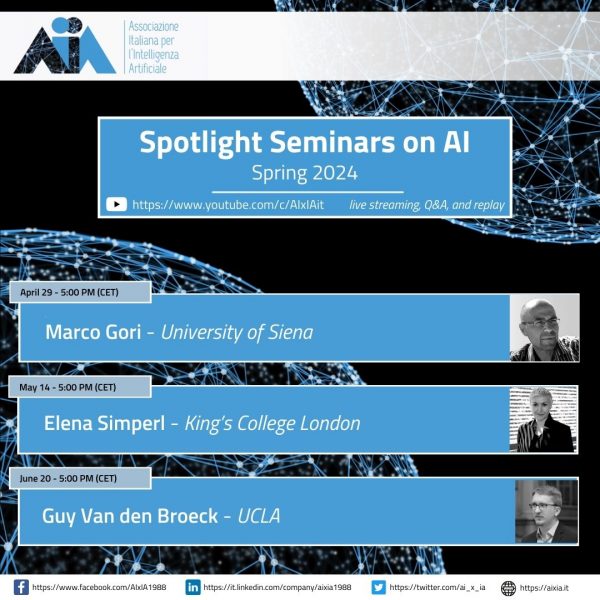1-3 July 2025, University of Twente, NL
Latest Updates
Registration for IACAP-AISB-25 is now open. Here is the link for registration system: https://2025.tickets.iacapconf.org/Further information on the preliminary programme will be communicated and published on the conference website: https://iacapconf.org/
For practical information including accommodation please visit here: https://iacapconf.org/pages/practical.html
Please note that there is an exciting free workshop with reception co-organised with, and sponsored by, 4TU.ethics on the Monday before the conference. Places are limited. More information is available on the conference and registration websites.
Call for Abstracts
The International Association for Computing and Philosophy (IACAP) and the Society for the Study of Artificial Intelligence and Simulation of Behaviour (AISB) will host a joint conference in July 2025. Please see below for joint CFA.
Conference dates: July 1-3
Conference website: https://iacapconf.org/
Host Organisation Websites:
IACAP.org
AISB.org.uk
Conference location: Enschede, NL.
Conference host: University of Twente
Keynote Speakers
AISB Keynote – Philip BreyIACAP Covey Award Address – To be announced soon. Nominations are closed.
IACAP Simon Award Address – To be announced soon. Nominations are closed.
Calls for Symposia Contributions (still open)
If you consider submitting a paper for a symposium at IACAP/AISB, each symposium has its own submission format, specifications and timeline. Here are the symposia that are open for submissions:- Symposium and Edited Volume: Teaching With and About AI using Engagement Philosophy and Case Studies. Deadline: 28 February 2025.
- Symposium and Proceedings: Moral and Legal AI Alignment. Deadline (extended): 15 March 2025.
- Symposium: AI and Animals: Ethical Impacts of Artificial Intelligence on Non-humans. Deadline: 14 February 2025 – submissions closed.
- Symposium: Reimagining AI Agents: Artificial, Angelic, or Adversarial Intelligences?. Deadline (extended): 28 March 2025.
- Symposium: Bridging Justice and Meaningful Human Control in Medical AI. Deadline (extended): 15 March 2025.
- Symposium: Generative Companionship in the Digital Age: On Human-AI Relationships and the Ethical Landscape Surrounding Artificial Others. Deadline: 15 March 2025.
Accepted Symposia in closed format (no call for contributions)
- Advancing Debates on the Epistemology of Medical AI, with Juan M. Durán, Emanuele Ratti, Emma-Jane Spencer and Chirag Arora
- The Epistemic Risks of AI Integration, with Ian Robertson, Sascha Fink, Hadeel Naeem and Brandon Ashby
- Values and AI Systems, with Vincent C. Müller, Max Hellrigel-Holderbaum, Ibifuro Robert Jaja and Eleonora Catena
Call for Abstracts and Symposia Proposals (all closed)
The International Association for Computing and Philosophy (IACAP) has a long-lasting tradition of promoting philosophical dialogue and interdisciplinary research on all aspects of computing as it relates to philosophy. IACAP’s members have contributed to shaping the philosophical (both theoretical and applied) debate about computing, information technologies, and artificial intelligence.
The Society for the Study of Artificial Intelligence and Simulation of Behaviour (AISB) is the largest Artificial Intelligence Society in the United Kingdom. Founded in 1964, the society has an international membership from academia and industry, with a serious interest in Artificial Intelligence, Cognitive Science and related areas. It is a member of the European Coordinating Committee for Artificial Intelligence.
Our joint 2025 annual meeting will gather philosophers, ethicists, roboticists, and computer scientists and engineers interested topics that include:
- Artificial Intelligence and Machine Learning
- Ethics, Philosophy, and Societal Impact of AI and Computing
- Robotics, Autonomous Systems, and Human-Machine Interaction
- Cognitive Science and Computational Models of Mind and Behavior
- Embodied, Ecological, and Distributed Cognition
- Consciousness, Emotions, and Affective Computing
- Symposia – will typically run one or two full days. Successful applicants will issue their own CfPs and organise reviews
- Individual papers – typically as 30-minute talks (including Q&A)
- Poster presentations – either submitted as such or as alternative format for individual papers
- Workshops – more open, interactive format, typically as 90-minute sessions
Depending on format, submissions may be published in proceedings either as extended abstracts or as full papers.
Important Dates
- Symposia Proposals due date (extended, was December 1): January 15, 2025.
- Notification of acceptance for Symposia proposals: December 9, 2024 for all submissions sent before December 1, all others January 30, 2025.
- Extended Abstracts (approx. 1000 words) for individual Presentations, Posters, and Workshops independent of Symposia, due date (extended, was December 20): January 15, 2025.
- Notification of acceptance for Presentations, Posters, Workshops: March 31, 2025.
- Conference registration opens: April 1, 2025. (For individual papers, posters, and workshops: In case you need a visa, please note this with your submission so that we can facilitate an early review.)
Join the Community
For updates on IACAP conferences and to be part of the conversation with other attendees, you can join:- Our Slack channel here
- Our Mailing List here (no book or paper announcements)




